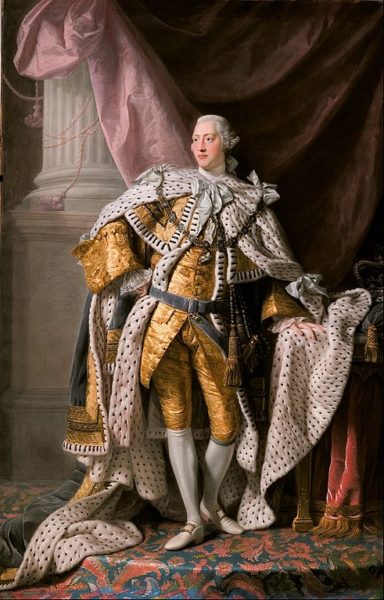Andrew Roberts reviews a new biography of King George III for The Critic:

King George III in his coronation robes.
Portrait by Allan Ramsay (1713-1784), original in the Art Gallery of South Australia via Wikimedia Commons.
Over the past six years, Penguin have been publishing their excellent Monarchs series in which a leading historian writes a 30,000-word book on a king or queen from Athelstan to Elizabeth II. There are now 45 of them (including David Horspool on Oliver Cromwell, who sneaks in despite the monarchical rubric, and Jonathan Keates who reasonably enough lumped William III and Queen Mary together). These extended essays are attractively produced, can be read in a couple of hours, and many are true gems, from historians such as Tom Holland, John Guy, Tim Blanning, Norman Davies, Roger Knight, Jane Ridley, Richard Davenport-Hines, David Cannadine — you get the idea.
Now Professor Jeremy Black gives us a full-throated defence of the monarch who is only really generally known as the king who went insane and who lost the American colonies, and who now prances around in the camp-yet-sinister show-stopping song in Hamilton: The Musical. “When considering George III’s mistakes,” Black argues, persuasively, “it is important to assess the parameters of the possible and to consider comparisons.” With his expertise in eighteenth-century European history, Black is able to place George III in the wider context of contemporary monarchs such as Catherine the Great, Frederick the Great, Louis XVI and Napoleon.
“In contradiction to the Whig and American image of George as a tyrant, or at least a would-be tyrant,” Black states, “he had a strong conviction of the value of limited monarchy and was a willing student of the lessons of the Glorious Revolution and the subsequent Revolution Settlement.”
Black brilliantly demolishes the paranoiac Whig view of George as trying to accrete powers to himself unconstitutionally. The George who emerges is a far more attractive figure than the Whig historians depicted, let alone Thomas Jefferson with his 28 histrionic and inaccurate accusations against George in the Declaration of Independence, and especially Lin-Manuel Miranda’s hilarious but profoundly historically incorrect caricature.
Instead, Black portrays a monarch with “a strong religious faith, a passion for hunting and an interest in art, architecture, music, astronomy and exploration”. He was a Renaissance man with an Enlightenment viewpoint, although Black also lists his failings, which were obstinacy, self-righteousness and a certain amount of priggishness when young. Black calls him a “fogey”. These were hardly cardinal sins, and a world away from the lust for dictatorship of which he has been accused.
Jeremy Black — who is fast becoming a national treasure in his own right, having written well over 100 books — takes a refreshingly unmodish stance towards George (as you might have guessed from listing hunting amongst the king’s attributes). “His qualities are easier to understand for those who prize commitment, duty, and integrity,” he concludes, “than in a modern age when scorn and satire, even hatred of the nation’s history, are often prominent.”



